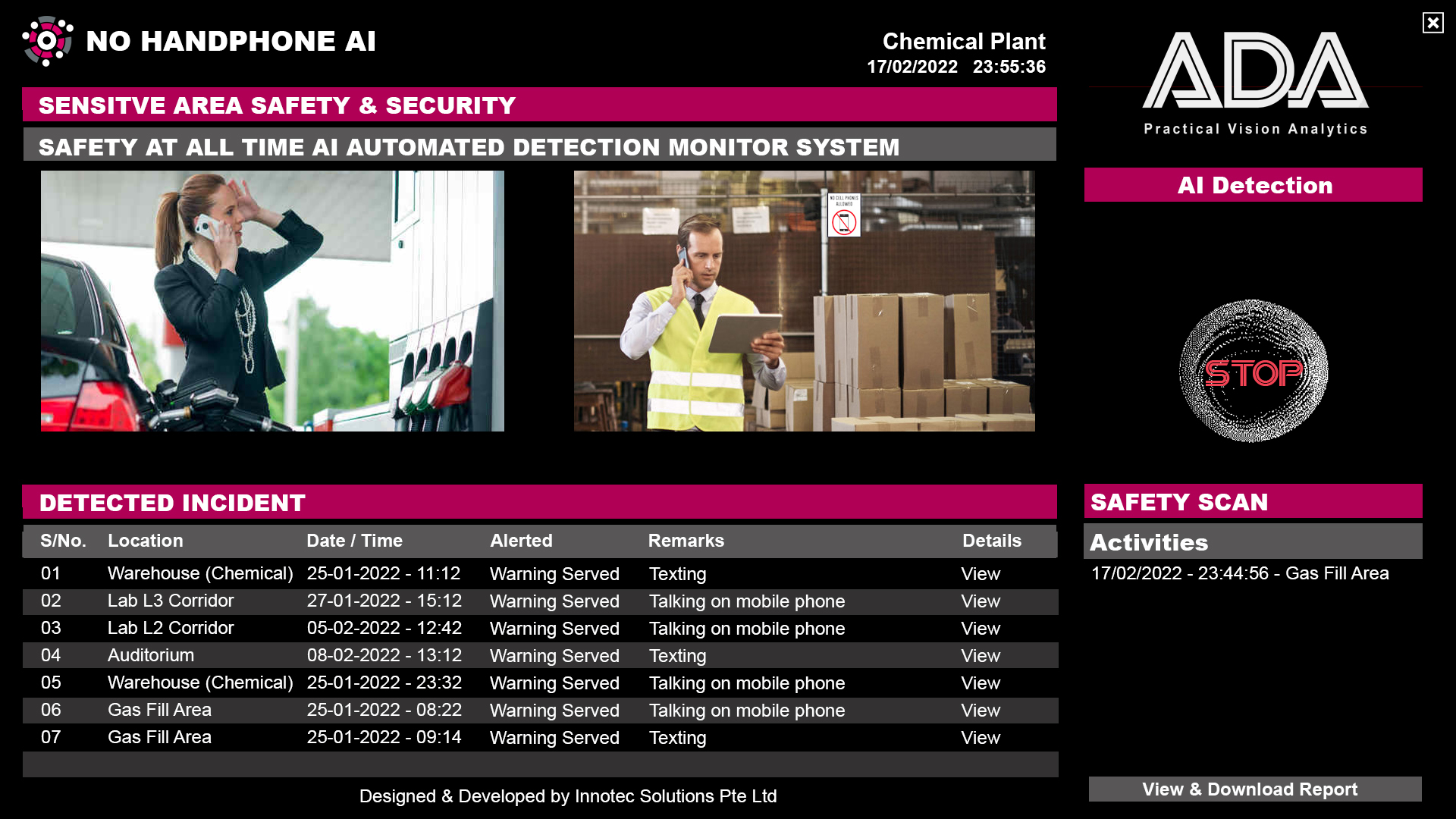ADA No Handphone AI

- Plug and Play with existing CCTV Camera System
- Non-GPU based Video Analytics Engine
Introduction: Enhancing Security: AI Integration in Surveillance Systems for Mobile-Restricted Spaces
In an era where technology continuously evolves, the integration of Artificial Intelligence (AI) into surveillance systems has become a game-changer, especially in places or workplaces that restrict the use of mobile devices. These environments demand heightened security and monitoring capabilities to ensure the safety of individuals and assets. ADA AI's ability to analyze vast amounts of data in real-time, identify patterns, and make intelligent decisions makes it an invaluable tool in enhancing surveillance systems.
Problem Statement:
The need for heightened security in mobile-restricted spaces arises from the limitations of traditional surveillance systems. Conventional cameras and monitoring techniques often struggle to keep pace with the dynamic nature of security threats. Mobile-restricted areas, such as government facilities, research labs, or secure corporate environments, require advanced monitoring solutions to prevent unauthorized access, monitor employee activities, and respond promptly to potential security breaches.
Limited Traditional Surveillance:
Conventional systems struggle to effectively monitor and manage mobile device usage in restricted spaces.
Dynamic Security Threats:
Unauthorized Access Concerns:
Inadequate Behavior Analysis:
Operational Inefficiencies:
Need for Proactive Measures:
Access Control Limitations:
Technology Lag:
Use Case:
Consider a government research facility that strictly prohibits the use of mobile devices within its premises. In such a scenario, ADA No Mobile Device AI integration in surveillance systems proves indispensable. Advanced AI algorithms can be trained to differentiate between authorized personnel and potential intruders, flagging suspicious behavior in real-time. Facial recognition technology can be leveraged to enhance access control, ensuring that only individuals with the proper credentials gain entry. Additionally, ADA AI-powered video analytics can monitor and analyze employee activities, allowing for proactive identification of anomalies and potential security risks. This use case demonstrates how ADA AI not only enforces security measures but also optimizes operational efficiency by providing valuable insights into the daily activities within the facility.
Real-time Monitoring:
ADA AI integration enables continuous and real-time monitoring of mobile device activities in restricted areas.
Behavioral Analysis:
Frequency Control:
Access Control Enhancement:
Anomaly Detection:
Predictive Modeling:
Immediate Alerts:
Optimized Operational Efficiency:
Integration with Existing Systems:
Customization for Unique Environments:


Solutions:
The integration of ADA No Mobile Device AI in surveillance systems offers tailored solutions to the challenges posed by mobile device restrictions in controlled frequency areas. ADA AI-powered algorithms can dynamically adapt to changing frequency patterns, ensuring comprehensive monitoring. Behavioral analysis and anomaly detection become more robust, allowing for the swift identification of unauthorized device activities. Additionally, ADA No Mobile Devices AI enables predictive modeling, anticipating potential breaches and providing security personnel with proactive measures to safeguard against threats in frequency-restricted zones. The synergy between AI and surveillance technology thus emerges as a powerful solution to the nuanced challenges presented by restricted mobile device usage in controlled frequency areas.
Dynamic Frequency Adaptation:
ADA AI algorithms can dynamically adapt to changing frequency patterns, ensuring effective monitoring and management in frequency-restricted areas.
Behavioral Analysis and Anomaly Detection:
Access Control Enhancement:
Proactive Security Measures:
Immediate Alerts:
Interoperability with Existing Systems:
Customization for Specific Environments:
Efficient Response to Incidents:
Adaptive Access Policies:
Continuous Monitoring:

